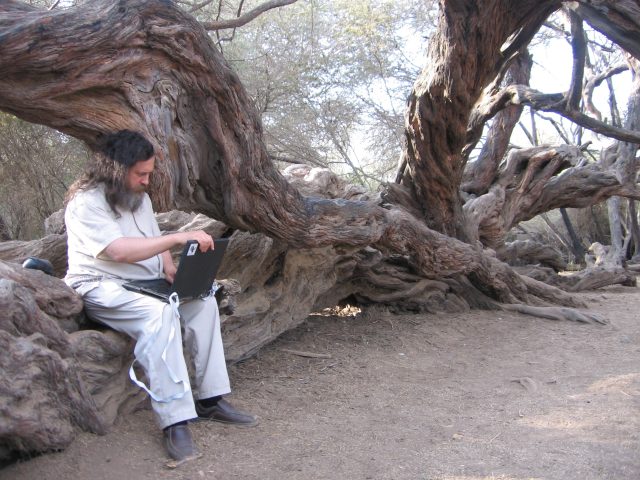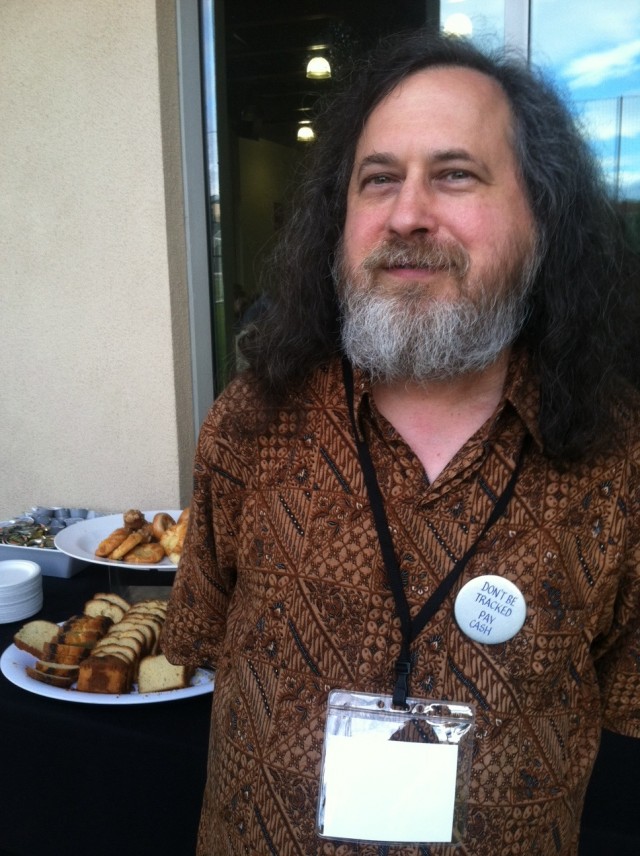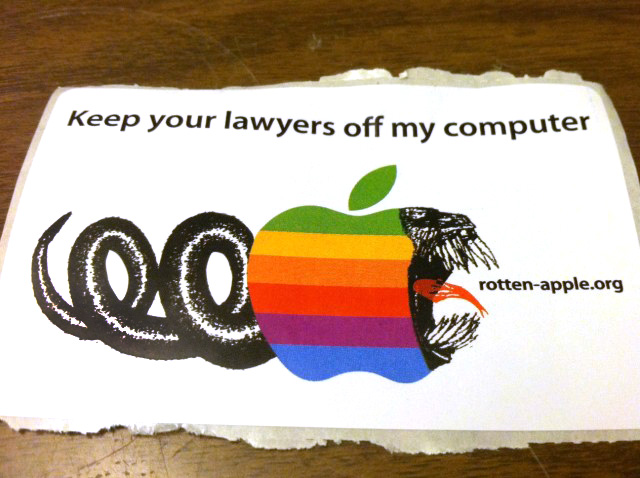
The large, bearded man bounded to the front of the room last Friday, hand thrust into the air, fingers shaking. It was a question-and-answer session, but he clearly wouldn't be able to wait long. He began speaking just before a conference organizer moved to hand him the microphone.
"So many stupid insults—and mistakes!" shouted Richard Stallman, the father of the free software movement. "I proposed a way to solve the problem! It's elegant, and it gets right to the point. Your criticisms are completely wrong."
The speaker he was denouncing, Professor John Duffy of the University of Virginia, had been defending software patents to the assembled crowd a moment ago. Duffy was actually proposing reforms, but as was the case with most speakers at this legal conference, Duffy's reforms weren't quite what Stallman was looking for. He was looking for a "safe harbor" for software—essentially, a total ban on any patents that touched on software.
Duffy raised the specter that some things might not be invented at all without patents, in software and other fields. "The only thing worse than a patented technology that burdens the public is not having a technology at all," he said. Sure, some software patents were a pain, but others were protecting important work. "The question is, will you get very serious research that is patent-motivated? Speech recognition, for example, is very patent-intensive."
In Stallman's view, the idea that society might be able to eliminate "bad patents" while keeping good ones is a kind of Jedi mind trick. Offering patents as a reward for software development—a system where the prize is a right to shut down someone else—is fatally flawed.
"Consider the MP3 patent," said Stallman. "That caused a lot of harm. It's not trivial, it came from a research institute. But we can fund research institutes in other ways."
The deprivation of some unnamed technology doesn't excuse a system that allows some developers to be subject to legal attacks, Stallman continued. We could live without those things. "Yes, we can be better off without certain things," said Stallman, finishing up his lecture to a flustered Duffy. "Maybe it wouldn't be quite as good, but we would all be okay. None of us would be shafted."

An eccentric with an unwavering plan
Stallman's long hair, shaggy beard, and potbelly make him look like a kind of tech-age guru, a software Buddha. He comes across as eccentric, especially in the context of a legal conference.“These patents put all software developers in danger, and users as well—a danger there's no reason we should stand for.”
He is also, those closest to him acknowledge, a genius. He would seem a bit like your crazy uncle—if his accomplishments weren't so well-known. Those include creating key components of the free software system that he calls GNU/Linux (and many others call simply Linux) as well as creating the most widely used software license in the world, the GNU General Public License.
The audience at the Santa Clara University conference Stallman spoke at, "Solutions to the Software Patent Problem," wasn't exactly a buttoned-down crowd, but Stallman managed to stand out. He wore a loose brown shirt with a flowery print and black sneakers with velcro straps. As always, he carried no cell phone. Pinned to his chest was a large white button: "Pay Cash—Don't Be Tracked."
Instead of business cards, Stallman has "pleasure cards." In addition to his name and contact information, they say: "Sharing good books, good food and exotic music and dance - tender embraces - unusual sense of humor."
His was the first talk on the agenda—and the only one of the day to not be streamed. "Streaming online would require use of [the] Microsoft Silverlight plug-in, which would pressure people to use proprietary software," explained Andrew Chin, the law professor who introduced Stallman. "Dr. Stallman considers it wrong to pressure people to do that." (The crowd was told a recording would be made available later in OGG or WebM format.)
The fundamental problem is this: every software patent, Stallman explained, is a monopoly on a "computational idea." In fact, that's how he has started describing software patents—as "computational idea" patents. Patents "protect" a lot more than one specific program, even though most people don't realize that. "These patents put all software developers in danger, and users as well—a danger there's no reason we should stand for," Stallman argued.
Patenting the math in software, at its core, wasn't that different from patenting music, which must build on itself by necessity.
"Beethoven had lots of great ideas, and knew how to use them effectively," Stallman continued. "He combined his new ideas with lots of familiar ideas, so that they were not so alien and incomprehensible that they were rejected. They shocked people for a while, but then people got used to them.
"The idea that anyone could, or would have to, reinvent music from zero is absurd," he said. "It's the same with computing."
The reasonable way forward, in Stallman's view, would be to legislate a "safe harbor" for software. The definition of what might be a "software patent" was debated throughout the day, but to Stallman it was clear enough: software programs are ones that can run on a "general purpose machine." That would separate software from cases like Diamond v. Diehr, where a patent was granted over a special-purpose machine (the patent was on a method of curing rubber.) It would include software for devices that mix general purpose computers with some specialized hardware (like a smartphone, which would use specialized circuits to connect to a phone network.)
Stallman doesn't take a position on whether non-software patents should be abolished, although he's certainly tuned in to arguments that they should be. A broader ban is an almost entirely academic question, though. At the end of the day, Stallman rejects the idea that software can't be carved out of the patent system, entirely.
"The idea of really solving a problem strikes people as radical," said Stallman. "People think, we've got to look for partial solutions... well that's a mistake. It wouldn't do the whole job, and it would be harder to get it passed. There are lots of software developers, they're all threatened, and if we propose to protect them all, they will all have a reason to support it. Let's propose a real solution."
"A classic, deadweight social loss"
Stallman shared the stage with a surprising fellow speaker: Google general counsel Kent Walker. Walker heads up the legal department of the company most prominently under patent attacks from both competitors and so-called "trolls."
"The patent arena is not a pretty place to be right now," said Walker. "The troll problem is big, and getting bigger," a growing tax on innovation. "Some of these are bottom-of-the-barrel patents," he continued. "They cover common practices on the Internet, like showing an ad before a piece of content." (That was likely a description of the patent granted to Ultramercial.)
"Today the torrent of software patent litigation has become a waste for society," he continued. "It's a classic deadweight social loss." Those costs include legal costs as well as building defensive patent portfolios.
Walker discusses patent abuses by both trolls and big companies as part of the same problem. "Operating companies are increasingly selling off patents to trolls," he noted. "Either pressure to monetize or as a way to harm competitors."
Google seems more vociferously anti-troll than ever. But Walker is more focused on reforms like tightened-up patent claiming, or proposals like the SHIELD Act that could make it easier to recover attorneys' fees. The politics of the issue constrain him from making a blanket anti-software-patent statement like Stallman's.
The America Invents Act, a patent bill which ultimately contained little of the reform the tech sector was looking for, took around seven years of lobbying and negotiation to get passed, Walker noted. "It is politically challenging to start drawing hard lines between different sectors," said Walker. In Congress, politicians "have constituencies that resist the notion of trying to move away from a unitary patent system, into what they call silos."
An appeal for abolition, 20 years in
After his morning talk, Stallman drifted to the back of the room, focusing studiously on his small white laptop sporting a sticker of the GNU logo (which is, well, a gnu.) Apart from the afternoon outburst, he mostly worked silently, furrowing his brow, seeming oblivious to anything around him and the other speakers on stage.

I first started to understand the appeal of Stallman when I heard him speak at a 2007 event at San Francisco State University, especially his appeal to young people. He speaks in a language often missing from discussions of seemingly abstract concepts like patent laws. Lawyers speak about what is legal and what should be legal; Stallman begins with philosophy, with ethics, with how you should treat your neighbor.
Can you give a piece of software to someone? Why would the answer ever be no?
Can a person program a new solution to a problem? Why should anyone be able to stop such a thing?
That last thing, inescapably, is what software patents forbid—each and every one of them. Stallman refuses to let anyone forget that. The system has not changed, and his opposition to it is still full-throated and clear.
Stallman has always been focused on diction, sometimes to a seemingly absurd extent. Before giving an interview, he makes sure his two conditions are assented to: first, that he can't be called the father of "open source," a term he objects to; and most important, that the term "Linux" not be used as a standalone. Instead, any journalist wishing to speak to Stallman must agree to refer to GNU or GNU/Linux. "Otherwise you're denying us credit," and not placing readers' focus on the software freedoms that Stallman wants to emphasize.
He also can't stand the use of the term "intellectual property" in any context. The term is always confusing, he holds, roping together disparate areas of law.
While Stallman's ideas may be clear, they're far from the current political reality. Software patents started being widely awarded in the late '90s, and they now seem more entrenched than ever; while Google abhors them, its arch-rival Microsoft is increasingly enthusiastic about them.
Many proposals were floated on Friday that would limit the impact of software patents in some way, but Stallman's view was ultimately left as a kind of goal-post; few speakers agreed with his all-out drive to eliminate software patents. Some of the conference speakers are writing about their proposed solutions in a special Wired.com series, The Patent Fix.
After agreeing to his conditions, I spoke briefly to Stallman after his talk. I asked if there is anything about his proposal that is new?
Not really, he said. He's been saying the same thing for 20 years. Way back in 1992, Stallman wrote an op-ed for Computerworld magazine attacking US Patent No. 5,049,881, saying patents like that would turn software "into a quagmire."
Since then, his views haven't changed much. It's the reception that has changed, he said; more companies, like Rackspace, are coming out against patenting software. Apple, the "number one patent aggressor" in Stallman's view, is winning eye-popping verdicts against competitors—and losing big to patent trolls.
"I see more support for getting patents out of software," he said.
reader comments
232